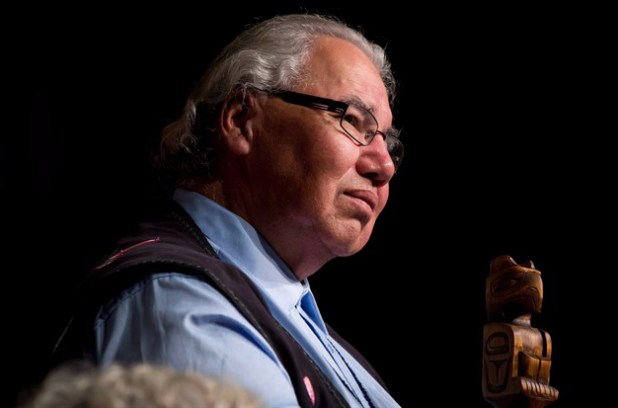Quotes about the Truth and Reconciliation Commission Report
Metro
Some quotes about the final report of the Truth and Reconciliation Commission on native residential schools: “The residential school experience is one of the darkest, most troubling chapters in our collective history.” — Justice Murray Sinclair, the commission chairman, in his final remarks on the report. “The survivors showed great courage, conviction and trust in sharing their stories. These were heartbreaking, tragic and shocking accounts of discrimination, of deprivation and all manners of physical, sexual, emotional and mental abuse.” — Sinclair. — “We have described for you a mountain. We have shown you the path to the top. We call upon you to do the climbing.” — Sinclair. — “We must be mindful that a process that will be as long and complicated as the reconciliation of seven generations of inequity will require stewardship, study and ongoing attention.” — commissioner Marie Wilson. — “To my fellow survivors here in the room, those watching elsewhere, and those who could not join us today, I cannot give enough thanks to you. Thank you for your courage and bravery throughout this whole journey.” — commissioner Chief Wilton Littlechild. — “So, there was a lot of tears. That train I want to call that train of tears.” — survivor Larry Beardy, quoted in the report, telling of a rail journey from his home in Churchill, Man., to an Anglican residential school in Dauphin, Man. — “Rid yourselves of those racist attitudes, the discriminatory attitudes, those images of indigenous peoples as being substandard and pagan and savage. Rid yourself of those racial stereotypes of Indians and indigenous people being dumb and lazy and drunk and on welfare. Rid yourself of those things so new things can come in … respect for our languages, our customs and our traditions, that we are equally as important as human beings.” — Assembly of First Nations National Chief Perry Bellegarde, urging Canadians to “make space” in their hearts for Aboriginal Peoples as a step on the road towards reconciliation. — “I just remember feeling really sad and I was in this truck full of other kids who were crying, and so I cried with them.” — From the testimony of Alma Scott, who was taken to a school in Fort Alexander, Man., at the age of five. — “I just remember, recalling the very first memories was just the beatings we’d get and the lickings and just for speaking our language and just for doing things that were against the rules.” — From the testimony of Geraldine Shingoose, who attended a school in Lestock, Sask. — “This was a policy of forced assimilation that not only destroyed the lives of individuals but of entire families and society and has had long-lasting implications on entire communities in this country. That’s why we moved forward with the apology and why this government has taken multiple actions over the years to improve the lives of aboriginal Canadians.” — Prime Minister Stephen Harper in question period. — “It’s an extraordinary amount of work that’s been done and it shows that all Canadians have to come together now and recognize the historic mistake that was the residential schools. It’s a time for healing. It’s a time for us to do things differently.” — NDP Leader Tom Mulcair. — “We will not forget the testimonies and we will remember the children who never made it home to their families.” — Mulcair in a statement. — “By recording the experiences of thousands of survivors, the TRC has ensured that all Canadians can gain a deeper understanding of this dark chapter in our collective history, and of the devastating and lasting legacy it has left on aboriginal peoples’ communities, cultures, languages, health, education, and welfare.” — Liberal Leader Justin Trudeau in a statement. — “I believe it’s our job as writers to speak out when the cultural basis of a people’s identity has been systematically destroyed. The trauma of that destruction lasts for generations, and the healing takes as long. Printed and spoken stories are at the heart of the reconciliation process.” — Heather Menzies, chair of The Writers’ Union of Canada, in a statement. — “These recommendations give us the means to work with aboriginal communities to begin to overcome the historical and ongoing injustices of brutal colonialism and cultural genocide.” — Green party Leader Elizabeth May. — “The commission’s final report will be a great legacy to all Canadians. The report will have the power to repair and heal a profoundly damaging past and to create greater understanding and empathy towards aboriginal people.” — Alberta Premier Rachel Notley.
|
.
Any original material on these pages is copyright © BishopAccountability.org 2004. Reproduce freely with attribution.
